\Tref\, a. [Yiddish, fr. Heb. t[e^]r[=e]ph[=a]h an animal torn by wild beasts.] Ceremonially unclean, according to the Jewish law; -- opposed to kosher.
Webster's Revised Unabridged Dictionary, © 1996, 1998 MICRA, Inc.

![]()
This series of drawings entitled Treyf, Yiddish slang for nonkosher, unclean, taboo, functions for me, as a process of questioning and provocation. The idea of what is kosher and what is not has expanded past food, to terms of acceptability or conduct within our culture.
Illuminating the space that both repulsion and desire occupies, I am interested in exposing various levels of desire, from nourishment to flesh. That hunger doesn't necessarily lead to gratification or fulfillment is subtly addressed by the limp and weighty humorous nature in which the images are rendered, raising notions of expectation and failure.
As a vegetarian, I am exploring American desire, consumption, overindulgence with power and fuel in pursuit of temporary satiation. I am examining codes of acceptability and conduct; of rules and parameters our culture establishes to immobilize (or liberate) its citizens.
As a Jewish woman I am considering the nature of temptation with regards to a kind of cultural betrayal. Fulfilling the desire of my great grandparents to be an assimilated American, begs me to ask the question of what it is I've left behind, and whether I've traded in my mother culture to be nourished by a sensibility in opposition to those before me.
When something is kosher in America, it's not necessarily food acknowledged and blessed by the appropriate Jewish food officials, it's a signal everything's OK, that everything is legal and clean. A set of rituals and laws that originally marked the distinct identity of a community on its own terms has become a universal code that references acceptance and serenity, emblematic, perhaps, of locating a deeper sense of home.